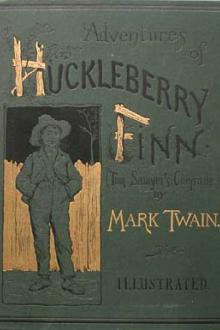The Adventures of Huckleberry Finn, Mark Twain [book club suggestions TXT] 📗

- Author: Mark Twain
Book online «The Adventures of Huckleberry Finn, Mark Twain [book club suggestions TXT] 📗». Author Mark Twain
We all said the duke was pretty smart, and there couldn’t be no trouble about running daytimes. We judged we could make miles enough that night to get out of the reach of the powwow we reckoned the duke’s work in the printing office was going to make in that little town; then we could boom right along if we wanted to.
We laid low and kept still, and never shoved out till nearly ten o’clock; then we slid by, pretty wide away from the town, and didn’t hoist our lantern till we was clear out of sight of it.
When Jim called me to take the watch at four in the morning, he says:
“Huck, does you reck’n we gwyne to run acrost any mo’ kings on dis trip?”
“No,” I says, “I reckon not.”
“Well,” says he, “dat’s all right, den. I doan’ mine one er two kings, but dat’s enough. Dis one’s powerful drunk, en de duke ain’ much better.”
I found Jim had been trying to get him to talk French, so he could hear what it was like; but he said he had been in this country so long, and had so much trouble, he’d forgot it.
XXIIt was after sunup now, but we went right on and didn’t tie up. The king and the duke turned out by and by looking pretty rusty; but after they’d jumped overboard and took a swim it chippered them up a good deal. After breakfast the king he took a seat on the corner of the raft, and pulled off his boots and rolled up his britches, and let his legs dangle in the water, so as to be comfortable, and lit his pipe, and went to getting his Romeo and Juliet by heart. When he had got it pretty good him and the duke begun to practice it together. The duke had to learn him over and over again how to say every speech; and he made him sigh, and put his hand on his heart, and after a while he said he done it pretty well; “only,” he says, “you mustn’t bellow out Romeo! that way, like a bull—you must say it soft and sick and languishy, so—R-o-o-meo! that is the idea; for Juliet’s a dear sweet mere child of a girl, you know, and she doesn’t bray like a jackass.”
Well, next they got out a couple of long swords that the duke made out of oak laths, and begun to practice the sword fight—the duke called himself Richard III; and the way they laid on and pranced around the raft was grand to see. But by and by the king tripped and fell overboard, and after that they took a rest, and had a talk about all kinds of adventures they’d had in other times along the river.
After dinner the duke says:
“Well, Capet, we’ll want to make this a first-class show, you know, so I guess we’ll add a little more to it. We want a little something to answer encores with, anyway.”
“What’s onkores, Bilgewater?”
The duke told him, and then says:
“I’ll answer by doing the Highland fling or the sailor’s hornpipe; and you—well, let me see—oh, I’ve got it—you can do Hamlet’s soliloquy.”
“Hamlet’s which?”
“Hamlet’s soliloquy, you know; the most celebrated thing in Shakespeare. Ah, it’s sublime, sublime! Always fetches the house. I haven’t got it in the book—I’ve only got one volume—but I reckon I can piece it out from memory. I’ll just walk up and down a minute, and see if I can call it back from recollection’s vaults.”
So he went to marching up and down, thinking, and frowning horrible every now and then; then he would hoist up his eyebrows; next he would squeeze his hand on his forehead and stagger back and kind of moan; next he would sigh, and next he’d let on to drop a tear. It was beautiful to see him. By and by he got it. He told us to give attention. Then he strikes a most noble attitude, with one leg shoved forwards, and his arms stretched away up, and his head tilted back, looking up at the sky; and then he begins to rip and rave and grit his teeth; and after that, all through his speech, he howled, and spread around, and swelled up his chest, and just knocked the spots out of any acting ever I see before. This is the speech—I learned it, easy enough, while he was learning it to the king:
To be, or not to be; that is the bare bodkin
That makes calamity of so long life;
For who would fardels bear, till Birnam Wood do come to Dunsinane,
But that the fear of something after death Murders the innocent sleep,
Great nature’s second course,
And makes us rather sling the arrows of outrageous fortune
Than fly to others that we know not of.
There’s the respect must give us pause:
Wake Duncan with thy knocking! I would thou couldst;
For who would bear the whips and scorns of time,
The oppressor’s wrong, the proud man’s contumely,
The law’s delay, and the quietus which his pangs might take.
In the dead waste and middle of the night, when churchyards yawn
In customary suits of solemn black,
But that the undiscovered country from whose bourne no traveler returns,
Breathes forth contagion on the world,
And thus the native hue of resolution, like the





Comments (0)